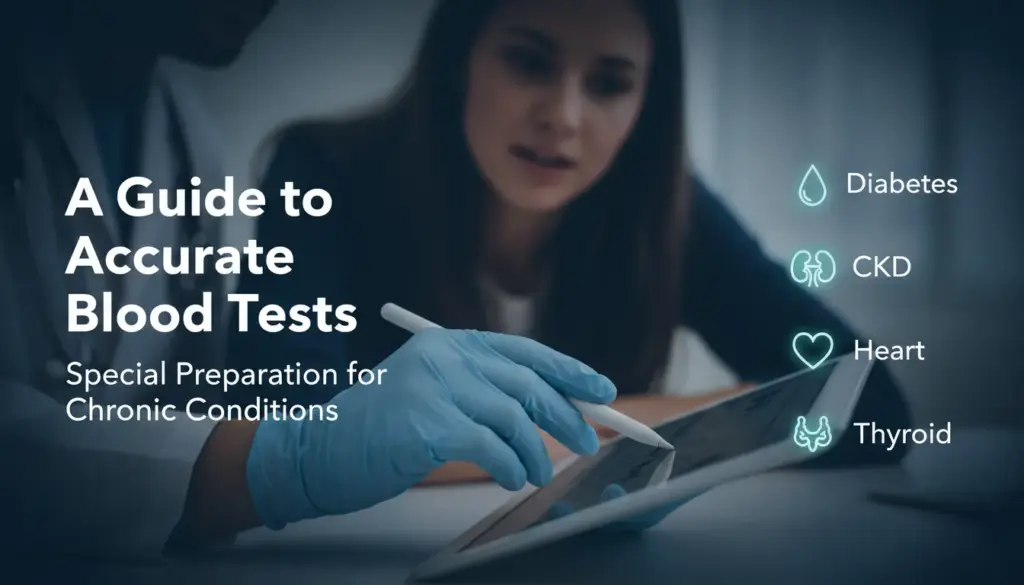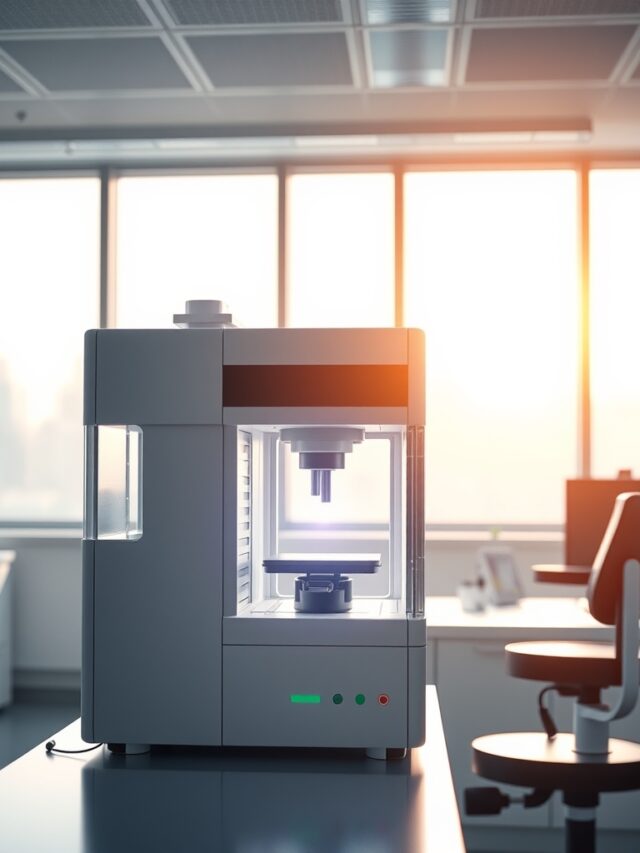For millions of Americans managing a chronic health condition, a blood test is far more than a routine checkup. It is a critical snapshot in time, guiding medication adjustments, treatment plans, and the overall strategy for a healthier life. When you live with diabetes, Chronic Kidney Disease (CKD), a heart condition, or a thyroid disorder, the accuracy of that snapshot is everything. Standard advice on preparing for a blood test often falls short, which is why understanding the need for special blood test preparation is so important.
Table of Contents
Your body’s unique physiology means that common factors like food, medication timing, and even supplements can have a much greater impact on your results. A small, unintentional error in your blood test preparation can lead to skewed numbers, causing unnecessary worry or, worse, incorrect treatment decisions. This guide provides the detailed, condition-specific information you need to prepare correctly, ensuring your results are as accurate as possible.
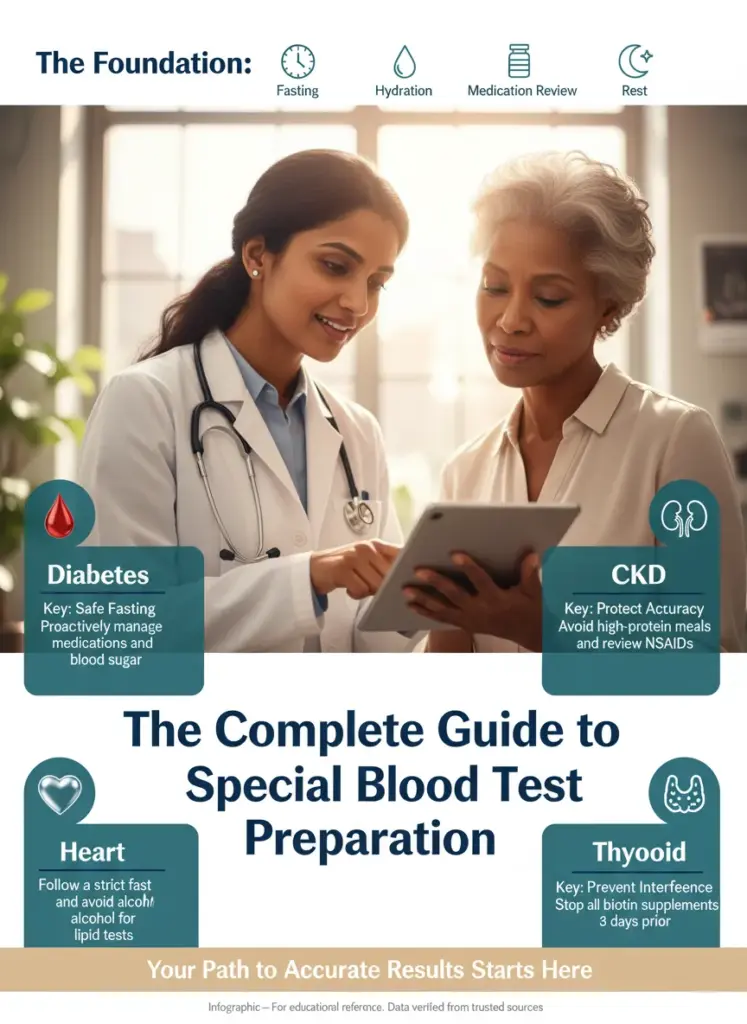
The Foundation: A General Blood Test Preparation Checklist for All Patients
Before we explore the nuances of specific conditions, every successful blood test begins with a solid foundation. These universal steps are recommended by clinical lab scientists and phlebotomists to ensure the process is smooth and the sample is viable. Consider this your essential guide on how to prepare for a blood test.
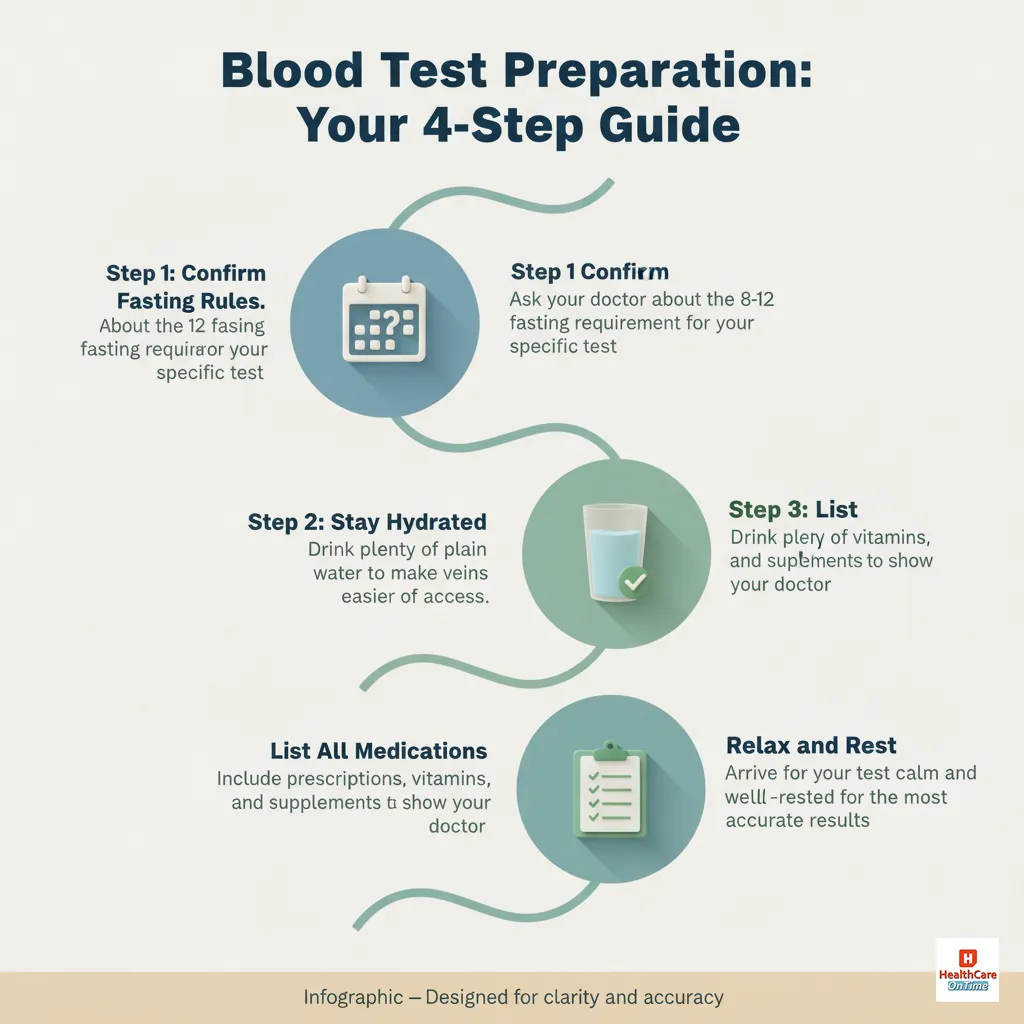
Confirm Your Fasting Instructions (and Why It Matters)
The most common question patients ask is whether they need to fast. Fasting means abstaining from all food and drinks, except for water, for a specific period, usually 8 to 12 hours. This is crucial for tests where recent nutrient intake can alter blood levels.
Common tests requiring fasting include:
- Fasting Blood Glucose (for diabetes)
- Lipid Panel (cholesterol and triglycerides)
- Basic and Comprehensive Metabolic Panels
- Iron Tests
Always ask your doctor for clear blood test fasting instructions. If your test does not require fasting, you can eat and drink normally.
Hydration is Your Best Friend: The Phlebotomist’s Secret Weapon
Even when fasting, drinking plenty of plain water is essential. Proper hydration makes your veins plumper and more accessible, which helps the phlebotomist find a good vein on the first try. This simple step in your blood test preparation can make the blood draw quicker and much more comfortable. Dehydration can also concentrate your blood, which may slightly alter some results.
Create a Comprehensive List of Medications & Supplements
Your doctor needs the full picture of what you are taking. Before your appointment, write down a complete list of:
- Prescription medications
- Over-the-counter drugs (like aspirin or ibuprofen)
- Vitamins and mineral supplements
- Herbal remedies
This information is vital because many substances can interfere with test results. Providing this list is a key part of how to prepare for a blood test safely.
What to Avoid 24-48 Hours Before Your Test
To ensure your baseline levels are measured accurately, it is best to avoid certain activities and substances.
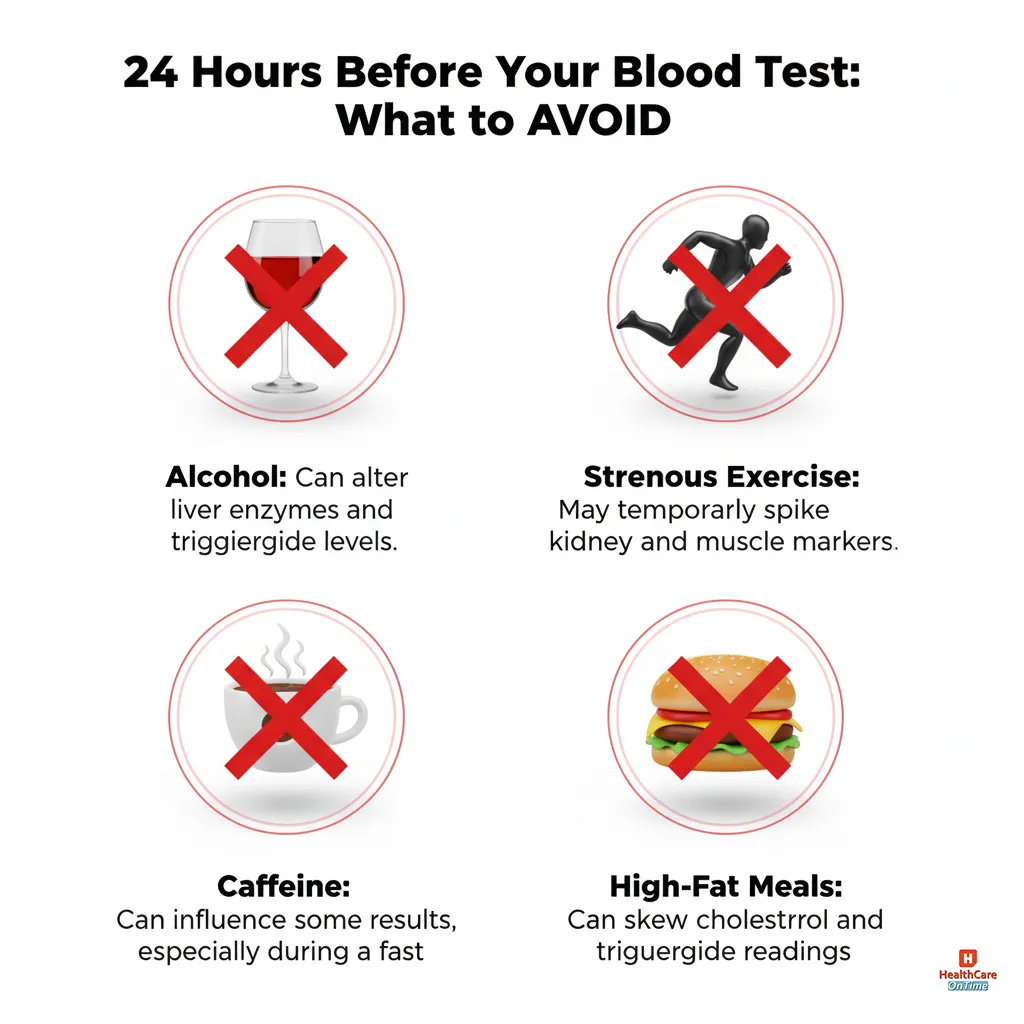
- Alcohol: It can affect liver enzymes and dramatically increase triglyceride levels. Avoid it for at least 24 hours.
- Strenuous Exercise: Intense physical activity can temporarily elevate markers of muscle damage, kidney function, and inflammation.
- Caffeine: While often acceptable for non-fasting tests, it is best to avoid it during a fast as it can influence some results.
- High-Fat Meals: A heavy, fatty meal the night before a lipid panel can skew your triglyceride reading.
The Critical Differences: A Comparative Guide to Special Blood Test Preparation
The core of effective special blood test preparation lies in understanding how your specific condition changes the rules. The following table provides a high-level comparison, which we will explore in greater detail in the sections below.
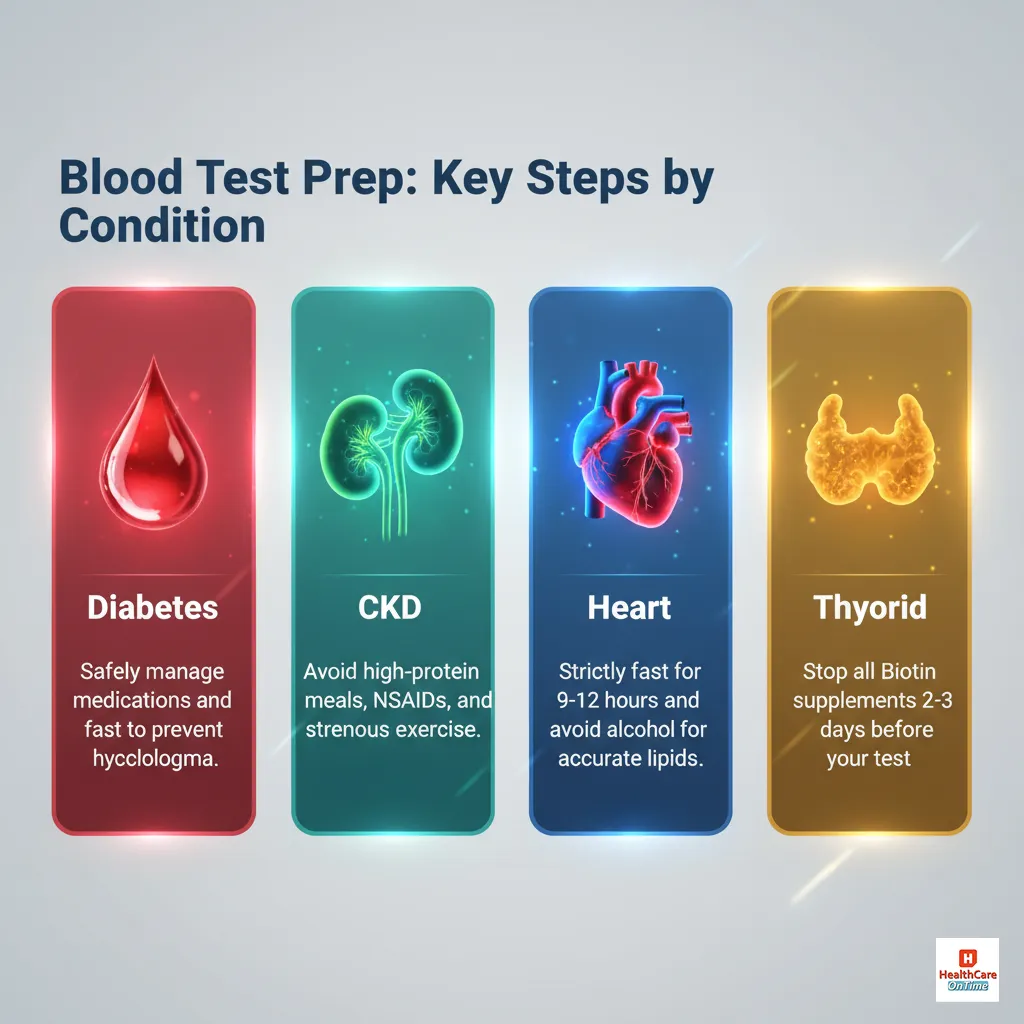
| Feature | Diabetics | CKD Patients | Heart Patients | Thyroid Patients |
| Primary Tests | Fasting Blood Sugar, HbA1c, Glucose Tolerance | eGFR, Creatinine, BUN, Electrolytes | Lipid Panel (Cholesterol, Triglycerides), hs-CRP | TSH, Free T3, Free T4 |
| Fasting Rules | Crucial for glucose tests (8-10 hrs). Must be carefully managed to avoid hypoglycemia. | Often required if part of a metabolic panel. Fluid intake may be restricted. | Essential for accurate triglyceride results (9-12 hrs). | Not usually required for TSH alone, but often done with other fasting tests. |
| Medication Alert | Discuss insulin/oral med timing with a doctor. Never skip without advice. | Avoid NSAIDs. Certain blood pressure meds may need review. | Continue statins & BP meds unless told otherwise. | Stop Biotin (B7) supplements 2-3 days prior. Discuss levothyroxine timing. |
| Dietary Notes | Avoid sugary drinks/food before fasting period. Plan a post-test snack. | May need to avoid high-protein meals (like cooked meat) 24 hrs prior to creatinine test. | Avoid high-fat meals and alcohol 24 hrs prior to lipid panel. | No specific dietary restrictions unless instructed otherwise. |
Deep Dive: Blood Test Preparation for Diabetics (Glucose, A1c)
For anyone with diabetes, blood tests are the cornerstone of good management. The blood test preparation for diabetics focuses on one primary goal: achieving an accurate glucose reading without compromising your safety.
How to Safely Fast for a Morning Blood Sugar Test
A fasting blood sugar test requires a careful balancing act. The key is to minimize the fasting period and prevent hypoglycemia (low blood sugar). This is how to prepare for a blood sugar test safely and effectively.
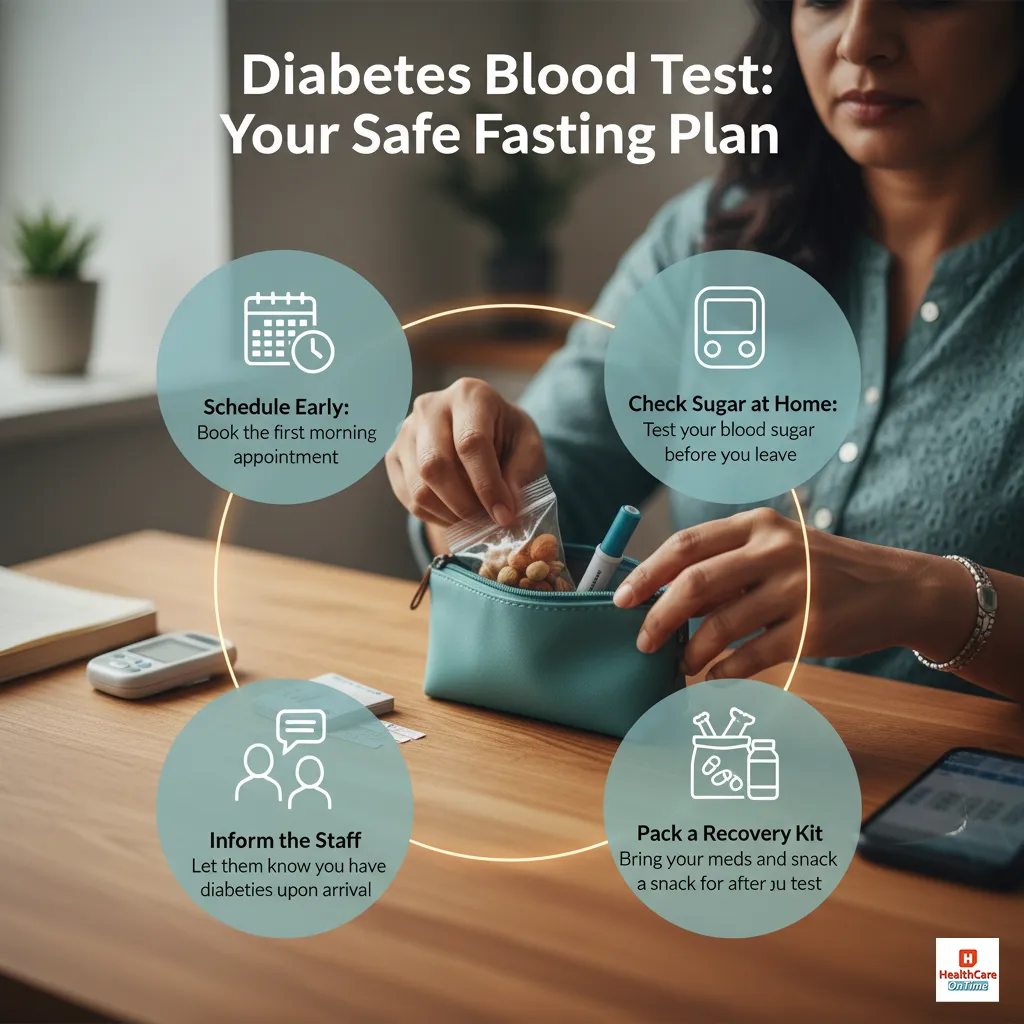
- Schedule Smart: Always request the earliest possible morning appointment. This way, most of your fasting occurs while you are asleep.
- Test at Home: Check your blood sugar with your home monitor before you leave for the lab. If it is too low (usually below 70 mg/dL), contact your doctor’s office for instructions.
- Pack a Recovery Kit: Bring your glucose meter, insulin or oral medications, and a healthy snack or glucose tablets with you. You will want to take your medication and eat right after the blood draw is complete.
- Inform the Staff: When you arrive at the lab, let the front desk and the phlebotomist know that you have diabetes. This ensures they are aware of your needs and can prioritize you if possible. This is a critical step in the blood test preparation for diabetics.
Knowing how do diabetics safely fast for early morning blood tests can prevent serious complications and ensure your results are valid.
Managing Insulin and Oral Medications: A Doctor’s Advice
Never alter your medication dosage on your own. The correct approach to blood test preparation for diabetics must be guided by your healthcare provider.
- For Insulin Users: Your doctor will give you specific instructions. They may advise you to take a reduced dose of your long-acting insulin the night before or to wait until after your test to take your morning rapid-acting insulin.
- For Oral Medications: You will likely be told to skip your morning dose and take it with your meal immediately following the blood test.
This guidance is a crucial part of your special blood test preparation.
A1c vs. Fasting Glucose: Do I Prepare Differently?
The HbA1c test provides an average of your blood sugar over the past two to three months and does not require fasting. However, it is often ordered alongside a metabolic panel or lipid panel, which do require fasting. Always clarify with your doctor which tests are being run so you know how to prepare for a glucose test panel correctly.
Deep Dive: Special Blood Test Preparation for CKD Patients
When you have Chronic Kidney Disease, blood tests are the primary way your nephrologist monitors the health of your kidneys. The preparation for CKD blood test is designed to get the most accurate measurement of your kidney function.
Understanding Creatinine and eGFR: What Your Kidneys Say
Your blood tests will focus on key markers like creatinine and your estimated Glomerular Filtration Rate (eGFR). Creatinine is a waste product from muscle metabolism that healthy kidneys filter out. A high level can indicate that your kidneys are not functioning properly. Your eGFR is a calculation based on your creatinine level, age, and other factors that estimates how well your kidneys are filtering waste. Correct kidney function test preparation is vital for an accurate eGFR.
The Impact of Diet and Exercise on Kidney Function Tests
Your daily habits can influence your kidney markers, making specific preparation for CKD blood test essential.
- Dietary Protein: Consuming large amounts of cooked meat right before a test can temporarily increase your creatinine levels. Your doctor may advise you to avoid high-protein meals for 24 hours before your blood draw.
- Strenuous Exercise: Intense physical activity can also cause a temporary spike in creatinine. It is best to stick to light activity, like walking, for a day or two before your test.
Following these creatinine blood test instructions helps ensure the results reflect your true kidney function.
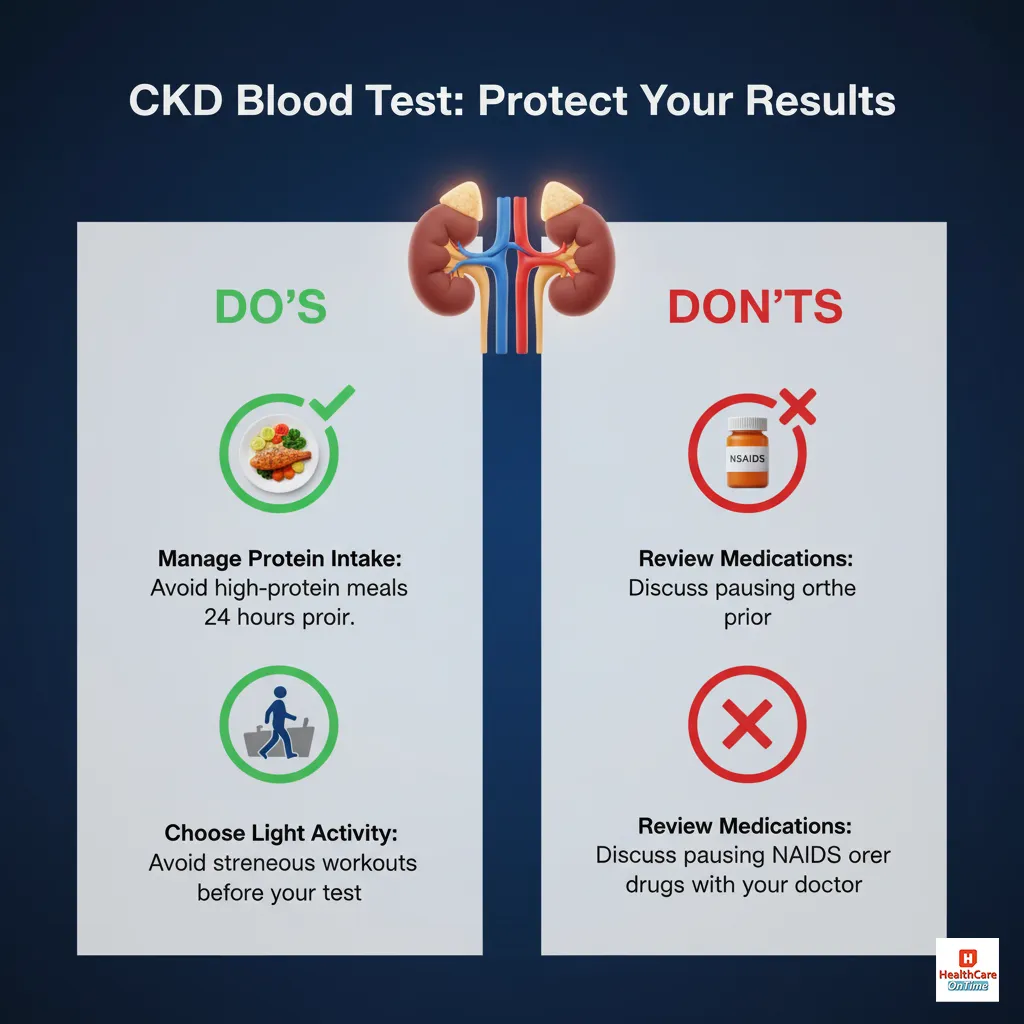
The Medication Minefield: What to Pause Before a CKD Blood Test
Certain medications can interfere with kidney function or the lab tests that measure it. The preparation for CKD blood test must include a thorough medication review with your doctor. Common culprits include:
- Nonsteroidal anti-inflammatory drugs (NSAIDs) like ibuprofen and naproxen.
- Certain antibiotics and blood pressure medications.
Never stop any prescribed medication without your doctor’s explicit instruction. This is a non-negotiable part of your special blood test preparation.
Deep Dive: Blood Test Preparation for Heart Patients (Cholesterol, Triglycerides)
For individuals managing heart disease or high cholesterol, the lipid panel is a fundamental tool. Proper blood test preparation for heart patients ensures that your cholesterol and triglyceride numbers are a true reflection of your cardiovascular health.
The Best Way to Prepare for Cholesterol and Triglyceride Tests
Your lipid panel measures several types of fats in your blood, including LDL (“bad” cholesterol), HDL (“good” cholesterol), and triglycerides. Following these cholesterol test preparation tips will yield the most accurate results.
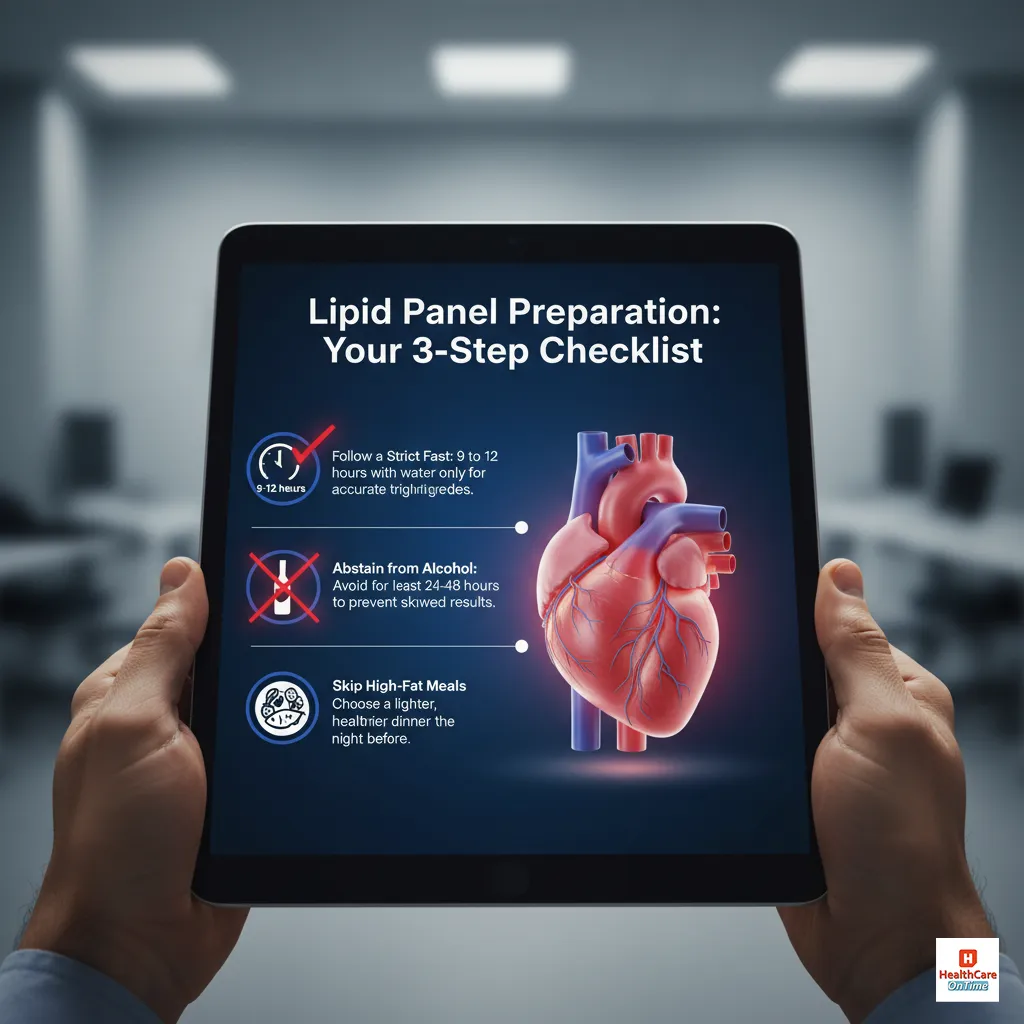
- Strict Fasting: A 9 to 12-hour fast (water only) is the standard for an accurate triglyceride measurement.
- Avoid Alcohol: Alcohol consumption can cause a significant, temporary spike in triglycerides. Abstain for at least 24 to 48 hours.
- Skip the Fatty Meal: A high-fat dinner the night before your test can also elevate triglycerides. Opt for a balanced, moderate meal instead.
Latest CDC/AHA Guidelines on Fasting for Lipid Panels
Medical guidance is always evolving. While a full fast has long been required for lipid panels, some recent guidelines from the American Heart Association and other bodies suggest that for certain risk assessments, a non-fasting test may be acceptable for measuring cholesterol. However, triglycerides are highly sensitive to recent meals. For this reason, the best way to prepare for cholesterol and triglyceride tests is still to follow fasting instructions unless your cardiologist explicitly tells you otherwise. This is a key part of your blood test preparation for heart patients.
How Blood Pressure and Statin Medications Affect Your Results
A common point of confusion is whether to take your daily heart medications. Unless your doctor says otherwise, you should absolutely continue taking your prescribed statins and blood pressure medications as usual. The goal of the test is to see how well these medications are working to manage your condition. Stopping them would defeat the purpose of the test.
Deep Dive: Preparation for a Thyroid Blood Test (TSH, T3, T4)
Thyroid function tests are incredibly sensitive to outside interference. The right preparation for thyroid blood test is simple but absolutely critical for avoiding a misdiagnosis or incorrect medication dosage.
The Biotin Trap: The #1 Mistake to Avoid Before a Thyroid Test
The single most important step in your TSH blood test prep is to stop taking biotin supplements. Biotin, also known as Vitamin B7, is found in many multivitamins and supplements for hair, skin, and nail health.
Biotin can interfere with the laboratory assays used to measure thyroid hormones, leading to falsely low TSH results and falsely high T3 and T4 results. This could make a person with hypothyroidism (underactive thyroid) appear to have a normal or even overactive thyroid. Stop all supplements containing biotin for at least 2 to 3 days before your test. This is the most crucial part of what to do before a thyroid blood test.
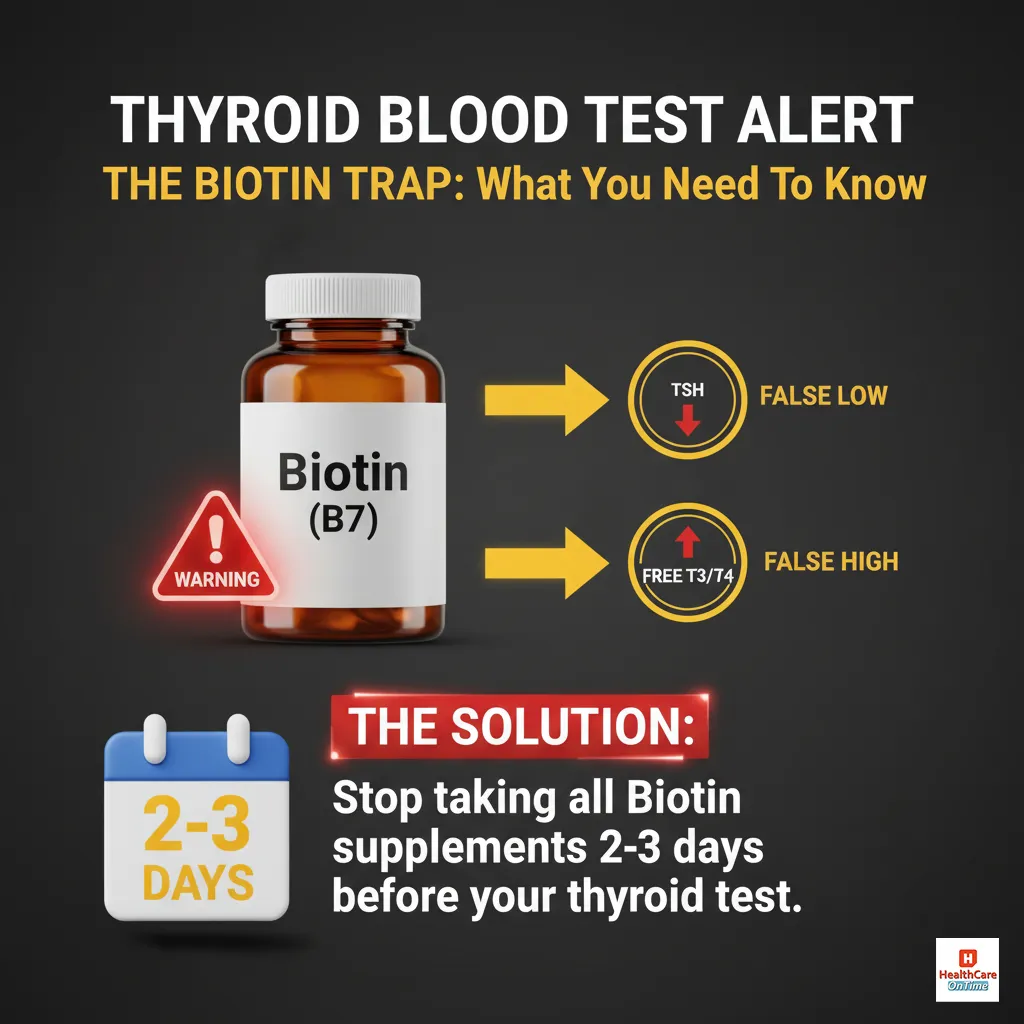
Timing is Everything: When to Take Your Thyroid Medication
If you take levothyroxine or another thyroid replacement hormone, ask your endocrinologist for specific instructions. Many doctors recommend taking your daily dose after your blood is drawn. This allows them to measure your baseline TSH level without the immediate influence of the medication. This advice is a key component of the preparation for a thyroid blood test.
Do I Need to Fast for a TSH Blood Test? The Definitive Answer
For a standalone TSH test, fasting is generally not required. However, your doctor may order a thyroid test as part of a larger panel of tests, such as a metabolic panel, that does require fasting. Always confirm the full list of tests being performed to ensure your blood test preparation is correct.
Common Interferences That Can Skew Your Blood Test Results
Beyond condition-specific advice, several universal factors can impact your blood work. Understanding these interferences is part of a complete approach to learning how to prepare for a blood test.
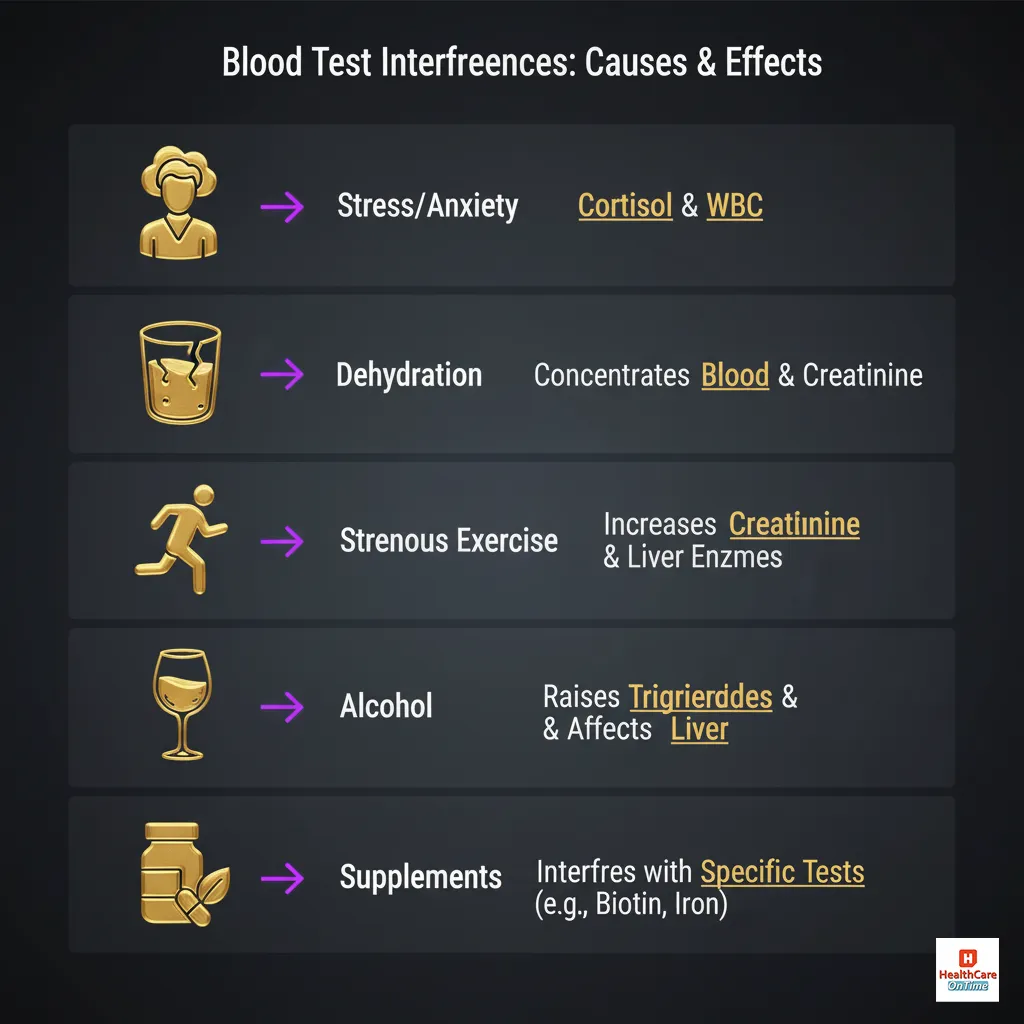
| Interference Source | Specific Impact on Blood Tests | Actionable Tip to Avoid |
| Stress/Anxiety | Can temporarily elevate cortisol and white blood cell count. | Practice deep breathing or mindfulness before your appointment. Inform the phlebotomist if you are nervous. |
| Dehydration | Concentrates blood components (like creatinine), potentially elevating them falsely. Makes veins difficult to find. | Drink plenty of water in the 24 hours leading up to your test, even if fasting. |
| Strenuous Exercise | Can increase creatinine, CK (creatine kinase), and liver enzymes. May affect cholesterol levels. | Avoid intense workouts for 24-48 hours before your blood draw. A gentle walk is fine. |
| Alcohol | Can significantly raise triglyceride levels and affect liver function tests. | Abstain from all alcoholic beverages for at least 24 hours, and ideally 48 hours, before your test. |
| Supplements | Biotin (thyroid), Iron (iron panels), Vitamin C (glucose/cholesterol tests). | Disclose all supplements to your doctor and pause any as instructed. |
Summary & Key Takeaways: Your Path to an Accurate Blood Test
Achieving an accurate and reliable blood test result is a team effort between you and your healthcare team. While the details can seem overwhelming, the right preparation is manageable and makes a significant difference in your long-term health management.
- Always confirm fasting and medication instructions with your doctor.
- Special blood test preparation is not optional; it is essential for patients with diabetes, CKD, heart, or thyroid disease.
- Hydration, avoiding alcohol and strenuous exercise, and disclosing all supplements are universal rules for success.
- For diabetics, safe fasting is paramount. For thyroid patients, stopping biotin is non-negotiable. For CKD and heart patients, medication and diet review is key.
Ultimately, this expert guidance on blood test preparation empowers you to take an active role in your healthcare, ensuring the data your doctor receives is a true and accurate reflection of your health.
Frequently Asked Questions (FAQs)
How do you handle anxiety before a blood draw?
Inform the phlebotomist that you feel anxious. They are trained to help and can offer suggestions like lying down, looking away, or using a smaller needle. Practicing deep breathing exercises before and during the draw can also help calm your nerves.
What happens if I accidentally eat before a fasting blood test?
You should call your doctor’s office or the lab to inform them. In most cases, you will need to reschedule the test. Eating before a fasting test, especially for glucose or triglycerides, will lead to inaccurate, elevated results.
Do blood pressure medications affect test results for CKD or heart patients?
Some can. Diuretics, for example, can affect electrolyte and kidney function results. However, you should never stop taking your prescribed blood pressure medication unless specifically instructed by your doctor as part of your blood test preparation for heart patients.
How long before a blood test should I stop taking biotin?
It is recommended to stop taking any supplements containing biotin for at least 2 to 3 days before a thyroid blood test to prevent interference. Always confirm this timeframe with your healthcare provider.
Why do I need to avoid alcohol before a cholesterol test?
Alcohol can be converted into triglycerides in the liver, and consuming it within 24-48 hours of a lipid panel can cause a significant and false elevation in your triglyceride levels, making the test results unreliable.
Is it better to take my daily medications before or after my blood test?
This depends entirely on the medication and the test. For thyroid medication, it is often taken after. For blood pressure medication, it is usually taken as scheduled. There is no single rule, so it is critical to ask your doctor for instructions on each medication you take.
Should elderly patients prepare differently for blood tests?
Yes, preparation may need to be adjusted. Elderly patients may be more susceptible to dehydration or hypoglycemia during a fast. Doctors will provide tailored blood test fasting instructions that may include a shorter fasting window to ensure safety.
What is the single most important preparation step for a diabetic patient?
The most crucial step is to have a clear plan from your doctor on how to manage your insulin or oral medications during the fasting period to prevent dangerously low blood sugar.
Can I still drink water when I’m supposed to be fasting?
Yes, absolutely. Drinking plain water is encouraged as it keeps you hydrated and makes the blood draw process easier for both you and the phlebotomist.
Does lack of sleep affect blood test results?
It can. Poor sleep can affect hormone levels, including cortisol and thyroid hormones, and may also impact glucose metabolism. Aim for a good night’s sleep before your test as part of your overall blood test preparation.
What should I do immediately after my blood test is complete, especially if I was fasting?
If you were fasting, you should eat your snack or meal and take any medications you were instructed to pause. It is also a good idea to drink some more water. If you feel dizzy or lightheaded, sit for a few minutes before leaving the lab.

